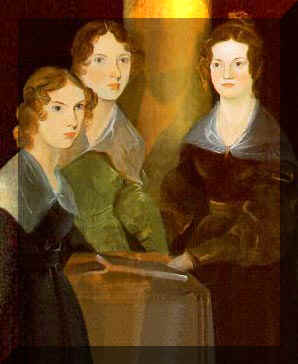Do you automatically conjure up an image of the authors you like? I used to love imagining what the authors behind the words looked like; then I discovered paperbacks, which commonly find a way to plaster a bio picture on a glossy cover somewhere. Everyone has some vision of what authors look like, and what the are like: dramatic, wordy creatures who sit hunched over a keyboard pouring out flowery words all day. The vision is almost never the same as the reality. Sometimes, when the reality doesn't fit that vision writers just can't get published.
In the Victorian Era, three women had to pretend to be men before anyone would pay any attention to their words. Today, millions have read at least one of their books -- which are always printed with their real names.
Creative Spirit
Literature was always a big part of the Bronte household, but tragedy would leave its mark as well. The family had six children in all, but their mother and the two oldest sisters would die young. This left Charlotte, Anne, Emily and their beloved bother -- who painted the picture of them above. He used to be in the painting, but later took himself out. They loved poetry and novels, and read the magazines their father subscribed to regularly. As children, they wrote stories on matchbook-sized papers and stitched them together with thread to create books.
As they matured, their writings (and their binding methods) became more polished. Charlotte, the most ambitious of the bunch, wrote to poet laureate Robert Southey to introduce him to her poetry. He wasn't very impressed, and she waited months to get a lukewarm reply. He was far too important a man, you see, to be bothered by a woman.
And maybe at that point, a lesser woman would have given up. She gave it her best shot. But Charlotte Bronte was far from finished. After discovering a notebook of her sister Emily's poetry, she began to put together a bold new plan: a joint project featuring writing from herself, Emily and Anne. They each picked their best poems, 19 from Charlotte and 21 from each other other two.
Only this time, they would use male names. The sisters decided to keep their relationship -- an their initials -- and transformed themselves into three brothers instead, and so the Brontes became the Bells. Using the names Currer, Ellis and Acton they submitted their poems as a collection and became published through a small company in 1846.
Three copies of the book were sold. One of those buyers, however, admired the work so much he wrote to the publisher to request the autographs of the authors. This is the only known document containing all three pen names.
It was little enough encouragement, but it was all the sisters needed. Each went about writing her own novel, and about a year later three great books were created.
Anne Bronte created Agnes Grey, a novel about a young governess. Her simple style of prose has been lauded as "perfect," and her insights on wealth and class-based society are still studied and discussed today. She wrote the book largely from her own experience as a working governess, and title character Agnes has a background and family life similar to Anne's own. It became popular shortly after publication. Anne Bronte continue to write and penned The Tenant of Wildfell Hall, regarded by many as one of the first feminist novels. Anne ran out of time before she managed to write another novel; her brief life ended at age 29.
Charlotte Bronte created a book that's considered classic today: Jane Eyre. Jane is a strong character who falls in love with the master of a grand house. The book is told in a first-person narrative which follows Jane through much of her life. Charlotte sent the book out with the two written by her sisters, receiving multiple rejections and dismissals. Finally she managed to get a deal where the three books would circulate through certain libraries. Jane Eyre quickly became a bestseller. It was an instant success, and it propelled Charlotte into the career she'd so wanted. Charlotte abandoned her pen name and became a well-known literary figure. She continued to write as a famous novelist, and finished two more full-length books before she died at age 38.
Emily Bronte was not famous in her own time, nor was her novel very well-regarded. Unlike her sisters, who wrote from their own experiences and created singular central characters, Emily was inspired by an old, desolate-looking house near her own country home. Also unlike her sisters, Emily never worked as a governess and wasn't too keen on publishing her novel. Emily was quiet and shy by nature, even around visitors to the family home. She didn't travel with Charlotte and Anne when they went to persuade publishers to buy the three novels, and her novel won immediate criticism. Some even condemned the book, which became quite controversial.
She became ill shortly after the book's 1847 release while attending her brother's funeral in the fall of 1848. By the time the year 1849 rolled around, Emily Bronte was gone at age 30. She never knew that her one novel, Wuthering Heights, became the most celebrated of all the Bronte works, or that I would write about her book some fifteen decades later.
Emily Bronte was one of many one-hit wonders in the literary world, and to this day one of the most well-known. Read this amazing post about other one-hit wonders. Sometimes, you don't need to write a dozen great books. Just one will do.
The Bronte sisters wrote in the trenches of fiction when the world said they shouldn't. They had to pretend to be men to find voices, and only after they'd already proven themselves was it safe to reveal their true identities. The somewhat tragic tale of the Bronte sisters is beautifully told in the movie Devotion, which I love, starring Olivia de Havilland as Charlotte Bronte. Watch it!
























